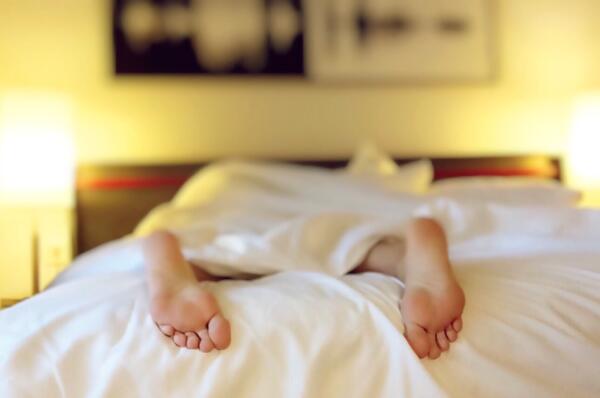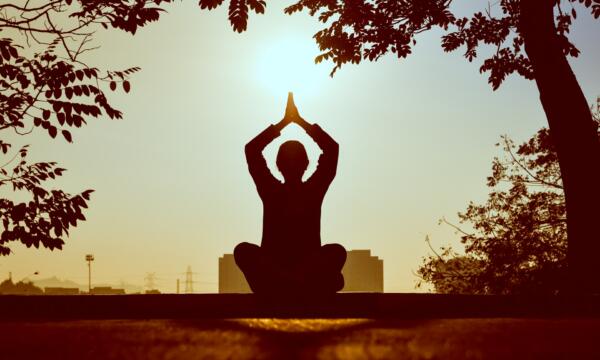When you think of the word healthy, what springs to mind? Diet? Exercise?
I bet you that it wasn’t sleep!
That’s because we often don’t realise the importance of sleep in our daily lives, and it is often the first thing sacrificed when we are busy or stressed or parents.
Yet sleep is essential for human life and good quality sleep rejuvenates us better than any smoothie or jog could ever do.
Here are the best science-backed ways to not only help you get to sleep but to also give you a better quality of shut-eye!

Coffee, tea and fizzy drinks more often than not contain caffeine. Caffeine blocks the sleep-inducing chemicals in the brain and so when you drink them, it causes you to feel and be more awake. Because caffeine has such a strong effect on your body, you would do well to avoid drinking coffee in the afternoon/evening. This will make sure that the caffeine’s effect will have left your system. Sadly it affects people differently and so you should be vigilant about how much you are drinking and if it affects your sleep. Don’t be afraid to cut caffeine out completely – even in the mornings – so that you don’t sacrifice any more sleep. If you don’t want to give up drinking and afternoon cuppa, it would be best to switch to decaffeinated varieties. (Source)
Change your diet
We’ve hit the obvious tip about drinking caffeine but what about what we eat?
Since dinner is the last meal before you go to sleep, it makes sense to make some changes to this meal to make sure you get a good night’s worth of rest. It’s recommended that you remove any foods that cause heartburn or indigestion and that it’s a lighter meal as these will help ease your body into a state of comfort. It’s also said that foods that are rich in omega-3 help promote better quality sleep and also recommend is eating a tablespoon of raw honey before bedtime (only on an empty stomach mind). Why? When you are asleep, your brain uses glycogen and the easily digestible raw honey can help replenish this supply (Source). This, in turn, will create stable glucose levels in your body for hours, thereby allowing you to sleep restfully.
Make your bedroom perfect for sleeping
To enjoy better quality sleep, you need to improve where you sleep.
Start by making your bedroom as dark as possible at night. Us humans are programmed to sleep when it’s dark, so by blocking out as much light as possible, you are more likely to go to sleep quicker. If your windows let in light, invest in blackout window shades or use dark curtains to keep your bedroom dark. This also means turning off your night lamp, TV and other appliances in the bedroom that give out even the smallest hint of light. Put your phone away about 30 minutes before you need to sleep to help give yourself a head start as well.

Cool your room
Did you know your internal body temperature is integral to regulating your biological body clock? When you’re falling asleep, your body temperature drops slightly, which some experts believe actually helps the process along, according to the Harvard Medical School. The National Sleep Foundation recommends a bedroom temperature of 15 to 20 degrees Celsius for the most sleep-friendly conditions. (Source)
“The secret is cool, dark, comfortable bedrooms,” says Lisa Meltzer, an education scholar for the National Sleep Foundation “Darkness cues the brain to make melatonin, which tells your interior clock that it’s time to sleep. Melatonin cools your internal body temperature, which reaches its lowest point between 2 and 4 a.m.” Speaking of temperatures.
Take a warm shower before bed
Warming your body up with a hot shower an hour before bed and then stepping into a cool bedroom will cause your body temperature to drop quickly! Studies show that this rapid temperature decrease slows your metabolism faster and prepares your body for sleep. “Showers can also be very relaxing, so that helps, too,” says Meltzer. If you shower every night around the same time, making it part of a consistent bedtime routine, you’ll see the most sleep value from it, she adds. “Then your body has an expectation of what’s coming next.”
Change your pre-sleep routine
Lastly, you will be sure you will get longer and a better quality of sleep every night by following the right pre-sleep practices. These include:
- Winding down and preparing to sleep at least two hours before bedtime. Make sure you keep your pre-sleep routine the same to ensure your body becomes aware of when to start winding down.
- Avoiding any kind of strenuous workout within two hours of bedtime. However, you can do yoga, Pilates and other kinds of non-strenuous relaxing workouts.
- Not watching TV, checking your phone or reading in bed, since these activities encourage your brain to associate your bed with wakefulness.
By following the tips above, you will get quality shut-eye every night.

Struggling to sleep? Try to force yourself to stay awake!
Is there anything reverse psychology isn’t good for? In this case, it may alleviate excessive sleep anxiety. A small study conducted at the University of Glasgow found that sleep-onset insomniacs who were instructed to lay in bed and try to stay awake with their eyes open fell asleep quicker than participants told to fall asleep without this “paradoxical intention” (PI). Participants in the PI group fell asleep easier and showed less sleep performance anxiety.
“I always tell people, sleep is the one thing in life where the harder you try and the harder you work at it, the more likely it is you’ll fail,” says Meltzer. “Reverse psychology is not a long-term solution, but it can help.”
Woken Up? Get up and do something for 10 minutes
If you wake up in the night and can’t get back to sleep within 15 minutes or so, get out of bed and do an activity that requires your hands and your head, like a jigsaw puzzle or a colouring book, says Richard Wiseman, professor for the Public Understanding of Psychology at the University of Hertfordshire and author of Night School: Wake up to the power of sleep. Stay away from the TV and digital screens, whose blue light has been proven to suppress melatonin, a sleep-inducing hormone. “The key is to avoid associating your bed with being awake,” Wiseman says. “This is a stimulus control theory,” says Meltzer. “Everything in life has a stimulus value, even your bed,” meaning your body should recognize that lying in bed means it’s time to go to sleep. “Getting out of bed if you can’t sleep is the hardest one to do, but it’s so important. If you’re spending 10 hours in bed, but only sleeping six, that’s really bad. Your bed becomes a place for thinking, worrying, watching TV, and not for sleeping.”
Wear socks to bed
Researchers from a Swiss study published in the journal Nature observed that warm feet and hands were the best predictors of rapid sleep onset. In the study, participants placed a hot water bottle at their feet, which widened the blood vessels on the surface of the skin, thereby increasing heat loss. Shifting blood flow from your core to your extremities cools down your body, working in concert with melatonin. The same trick works with wearing socks to bed!

Use the “4-7-8” method
Championed by best-selling author Dr Andrew Weil—and various wellness bloggers, the “4-7-8” breathing technique is purported to help you fall asleep in under a minute. The method is said to relax you by increasing the amount of oxygen in your bloodstream, slowing your heart rate, and releasing more carbon dioxide from the lungs. According to Dr Weil, here’s how you do it:
- Place the tip of your tongue against the ridge of tissue just behind your upper front teeth, and keep it there through the entire exercise.
- Exhale completely through your mouth, making a whoosh sound.
- Close your mouth and inhale quietly through your nose to a mental count of four.
- Hold your breath for a count of seven.
- Exhale completely through your mouth, making a whoosh sound to a count of eight.
- Repeat the cycle three more times for a total of four breaths.
Scent your bedroom with lavender
Not only does lavender smell lovely, but the aroma of this flowering herb may also relax your nerves, lower your blood pressure, and put you in a relaxed state. A 2005 study at Wesleyan University found that subjects who sniffed lavender oil for two minutes at three, 10-minute intervals before bedtime increased their amount of deep sleep and felt more vigorous in the morning.
Picture your favourite place
Rather than counting sheep, visualize an environment that makes you feel calm and happy. The key to success is thinking of a scene that’s engaging enough to distract you from your thoughts and worries for a while. In an Oxford University study published in the journal Behavior Research and Therapy, insomniacs who were instructed to imagine a relaxing scene, such as a beach or a waterfall, fell asleep 20 minutes faster than insomniacs who were told to count sheep or do nothing special at all.
Listen to music
Studies have shown that classical music, or any music that has a slow rhythm of 60 to 80 beats per minute, can help lull you to sleep. In a 2008 study, students aged 19 to 28 who listened to relaxing classical music for 45 minutes before bed showed significant improvement in sleep quality. Bonus: They also reported decreased symptoms of depression.
Practice progressive relaxation
Recommended by the National Sleep Foundation as a way to fall asleep fast, progressive muscle relaxation involves slowly tensing and then relaxing each muscle in your body to help your body relax. The Mayo Clinic describes the technique as follows:
Start by tensing and relaxing the muscles in your toes and progressively working your way up to your neck and head. You can also start with your head and neck and work down to your toes. Tense your muscles for at least five seconds and then relax for 30 seconds, and repeat.
“I encourage patients to try progressive relaxation,” says Meltzer. “It’s not enough by itself, but in combination with other things, it definitely makes a huge difference.”
Internal Clock completely messed up? Go camping for a full sleep schedule reset.
The thing that seems to have the most influence over our sleep patterns is exposure to light. However, in today’s world, almost everything we own has light; bedrooms, tv screens, phones. This means that our world is brighter for longer and that makes it hard for us to get on a good schedule. But there’s a simple solution: a camping trip. (Source)
A recent study on light exposure and its effects on sleep found that even a weekend camping trip was enough to reset sleep schedules to be more in line with the sunrise and sunset, helping people shift their schedule up to two hours earlier. Sleep hormone levels started following the same track after the weekend.





